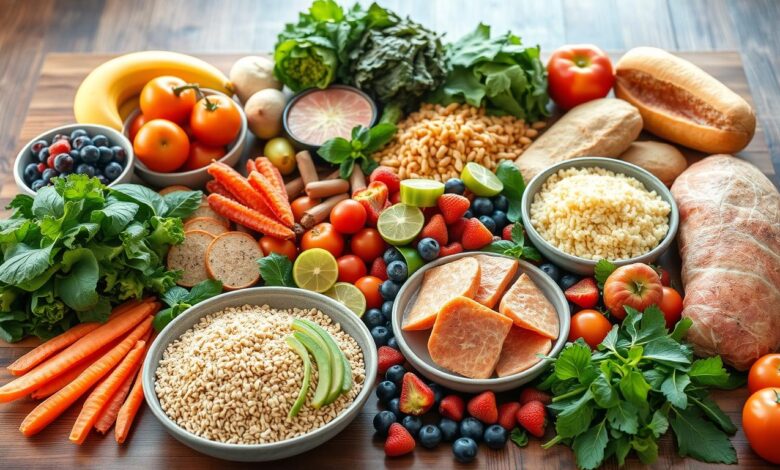Nutrition and Diet Tips During Cancer Treatment

Eating well is key for cancer patients. It helps them deal with treatment side effects and keeps them strong. Foods like fruits, veggies, whole grains, lean proteins, and healthy fats are best.
Following a healthy diet can greatly improve a cancer patient’s life. It boosts their chances of getting better. A good diet plan is vital for managing treatment’s challenges.
Knowing how important nutrition is during cancer treatment is crucial. With the right diet tips, patients can take charge of their health. This can lead to a successful recovery.
Key Takeaways
- A well-balanced diet is essential for cancer patients to cope with treatment side effects
- Nutrition during cancer treatment plays a critical role in recovery
- A cancer diet plan should include a variety of whole, unprocessed foods
- A healthy diet and nutrition plan can improve quality of life and increase chances of recovery
- Good nutrition during cancer treatment can make a significant difference in overall health
- A well-planned cancer diet plan can help patients navigate treatment challenges
Understanding Nutrition’s Role in Cancer Treatment
When it comes to cancer treatment, healthy eating during cancer treatment is key. A balanced diet gives the body the nutrients it needs. It helps with recovery and dealing with treatment’s physical and emotional side effects. By following cancer nutrition tips, patients can make better diet choices. This can lower the risk of problems and improve treatment results.
A healthy diet for cancer patients should have foods from all groups. This includes protein, healthy fats, complex carbs, vitamins, and minerals. Important nutrients for patients include:
- Protein: essential for building and repairing tissues
- Healthy fats: important for energy production and absorption of vitamins
- Complex carbohydrates: provide sustained energy and fiber
- Vitamins and minerals: essential for maintaining immune function and overall health
Understanding the link between diet and treatment success helps patients control their nutrition. This can support recovery, lower complication risks, and improve life quality.
It’s not just about what you eat, but how you eat too. Cancer patients might face taste, appetite, and digestion changes. By working with a healthcare team and following cancer nutrition tips, patients can get a nutrition plan that fits their needs. This supports their health and well-being.
| Nutrient | Food Sources | Benefits for Cancer Patients |
|---|---|---|
| Protein | Lean meats, fish, eggs, dairy, legumes | Supports tissue repair and maintenance |
| Healthy Fats | Nuts, seeds, avocados, olive oil | Supports energy production and vitamin absorption |
| Complex Carbohydrates | Whole grains, fruits, vegetables, legumes | Provides sustained energy and fiber |
Best Foods for Cancer Treatment: Essential Guidelines
When it comes to cancer treatment and diet, focus on whole, unprocessed foods. These foods are key for recovery. Include fruits, vegetables, whole grains, lean proteins, and healthy fats in your diet. They are packed with antioxidants, fiber, and nutrients that support cancer treatment and health.
Some top foods to add to your diet are:
- Berries, such as blueberries and raspberries, which are high in antioxidants
- Leafy greens, like spinach and kale, which are rich in fiber and vitamins
- Cruciferous vegetables, including broccoli and cauliflower, which contain cancer-fighting compounds
- Nuts and seeds, such as almonds and chia seeds, which are high in healthy fats and protein
Incorporating these foods can boost your nutrition and recovery chances. Drink plenty of water and avoid processed and sugary foods. A healthy diet supports your body during cancer treatment and improves well-being.
Always talk to your healthcare team before changing your diet. They can create a meal plan tailored to your needs and cancer treatment and diet goals.
| Food Group | Examples | Nutritional Benefits |
|---|---|---|
| Fruits | Berries, citrus fruits | High in antioxidants, fiber, and vitamins |
| Vegetables | Leafy greens, cruciferous vegetables | Rich in fiber, vitamins, and cancer-fighting compounds |
| Protein | Lean meats, nuts, and seeds | High in protein, healthy fats, and fiber |
Managing Side Effects Through Diet
Cancer treatment can be tough, and managing side effects is key for patients’ health. Eating right is important for cancer patients. It helps lessen nausea, loss of appetite, and other discomforts. By choosing the right foods, patients can feel better and stay healthy.
To manage side effects, eat small meals often, avoid spicy or fatty foods, and drink plenty of water. These tips can help with nausea and loss of appetite, common side effects. Also, staying hydrated is vital for health and can help with dry mouth and swallowing issues.
Dealing with Nausea and Loss of Appetite
- Eat small, frequent meals to avoid overwhelming the stomach
- Choose bland foods that are easy to digest
- Avoid strong-smelling foods that can trigger nausea
By following these tips and getting advice from doctors, cancer patients can handle side effects better. Eating well is crucial for a successful treatment journey.
Creating Your Cancer-Fighting Meal Plan
When it comes to cancer nutrition and diet, a balanced meal plan is key. It supports treatment and health. Eating whole, unprocessed foods helps cancer patients. This boosts their nutrition advice for cancer patients and recovery chances.
A good meal plan has protein, healthy fats, complex carbs, vitamins, and minerals. Include fruits, veggies, whole grains, lean proteins, and healthy fats. For example:
- Leafy green vegetables like spinach and kale
- Berries and other fruits high in antioxidants
- Whole grains like brown rice and quinoa
- Lean proteins like chicken and fish
- Healthy fats like nuts and avocado
Getting help from a healthcare team or dietitian is smart. They can make a meal plan just for you. Following a balanced diet and staying hydrated boosts health. This increases recovery chances.
Foods to Avoid During Treatment
When you’re going through cancer treatment, it’s important to watch what you eat. Eating the right foods can help you stay healthy and avoid problems. Foods to avoid include those that can weaken your immune system or affect your medicines.
A good cancer diet and nutrition plan is key. It helps you avoid foods that are risky. These include raw or undercooked meats, eggs, and dairy. These foods can have harmful bacteria like Salmonella and E. coli.
High-Risk Foods for Compromised Immune Systems
- Raw or undercooked meats, poultry, and seafood
- Unpasteurized dairy products and juices
- Raw or sprouted seeds and beans
It’s also important to know about food interactions with cancer medicines. For example, grapefruit and its juice can make some chemotherapy medicines less effective. Knowing these interactions can help you make better food choices and improve your treatment results.
Common Food Interactions with Cancer Medications
Being careful about what you eat can help you manage your cancer treatment better. A good cancer diet and nutrition plan can support your health and recovery during this tough time.
Staying Hydrated During Cancer Treatment
Drinking enough fluids is key for staying hydrated during cancer treatment. Patients often get dehydrated because of side effects like nausea and vomiting. Drinking plenty of fluids helps keep them healthy and lowers the chance of problems.
To stay hydrated, drink lots of water, clear broths, and drinks with electrolytes. Stay away from caffeinated and carbonated drinks, as they can make dehydration worse. Here are some tips to help you stay hydrated:
- Drink at least 8-10 glasses of fluid per day
- Include electrolyte-rich beverages, such as sports drinks or coconut water, in your diet
- Avoid caffeinated and carbonated beverages

By following these tips and focusing on staying hydrated during cancer treatment, you can live better and avoid complications. Always talk to your healthcare team for advice on cancer treatment and hydration.
| Fluids to Drink | Fluids to Avoid |
|---|---|
| Water | Caffeinated beverages |
| Clear broths | Carbonated beverages |
| Electrolyte-rich beverages | Alcoholic beverages |
Supplements and Cancer Treatment: What You Need to Know
Nutrition and diet are key in cancer treatment. Many patients take supplements to fill diet gaps. But, knowing how supplements and cancer treatment work is crucial for safe use.
Talk to your healthcare team about supplements. They can tell you which ones are safe and work well. Some, like vitamin D and probiotics, might help. But, others, like antioxidants, could harm cancer treatment. Your team can guide you in choosing the right cancer nutrition and supplements.
Safe Supplement Options
- Vitamin D: essential for bone health and immune function
- Probiotics: support gut health and immune system
- Omega-3 fatty acids: reduce inflammation and support heart health
Potential Risks and Interactions
Some supplements can harm cancer medications or make side effects worse. Knowing these risks is important. Talking to your healthcare team about supplements and cancer treatment helps you make smart choices about your diet.
Discussing Supplements with Your Healthcare Team
Talking openly with your healthcare team is key for cancer nutrition and supplements. Tell them about any supplements you’re taking or thinking about. This ensures you’re using supplements safely and effectively during cancer treatment.
| Supplement | Benefits | Risks and Interactions |
|---|---|---|
| Vitamin D | Supports bone health and immune function | None known |
| Probiotics | Supports gut health and immune system | May interact with certain medications |
| Omega-3 fatty acids | Reduces inflammation and supports heart health | May interact with blood thinners |
Working with Nutrition Professionals
A well-planned diet is crucial for cancer treatment. Nutrition professionals, like registered dietitians, can help create a meal plan tailored to each patient. They offer guidance on what foods are best for cancer patients, helping them make healthy choices.
Working with these experts helps patients deal with treatment side effects and stay at a healthy weight. Having a team that includes a dietitian and other healthcare professionals ensures patients get all-around care. This care addresses both physical and emotional needs.
When to Consult a Registered Dietitian
Cancer patients should see a registered dietitian early in their treatment. This helps keep their strength and energy up, lowers malnutrition risk, and reduces treatment side effects. Dietitians also help patients understand the best nutrition for their cancer care.

Building Your Support Team
Building a support team is key for cancer patients. This team should include a dietitian, oncologists, nurses, and social workers. Together, they provide care that covers physical, emotional, and social needs.
By working with nutrition professionals and other healthcare experts, patients get the best care. This support is vital throughout their treatment journey.
Conclusion: Empowering Your Cancer Journey Through Nutrition
As you face your cancer journey, eating well is a key ally. A balanced diet can help your recovery and lessen side effects. It also boosts your chances of a good outcome.
This guide shows how important nutrition is in cancer treatment. It talks about how diet affects treatment success and managing side effects. With your healthcare team, including a dietitian, you can create a nutrition plan that helps you stay in charge of your health.
Keep in mind, your cancer journey is special, and this guide is just the beginning. Use nutrition to fuel your healing and recovery. Make informed choices and let this knowledge be your strength on this brave journey.





